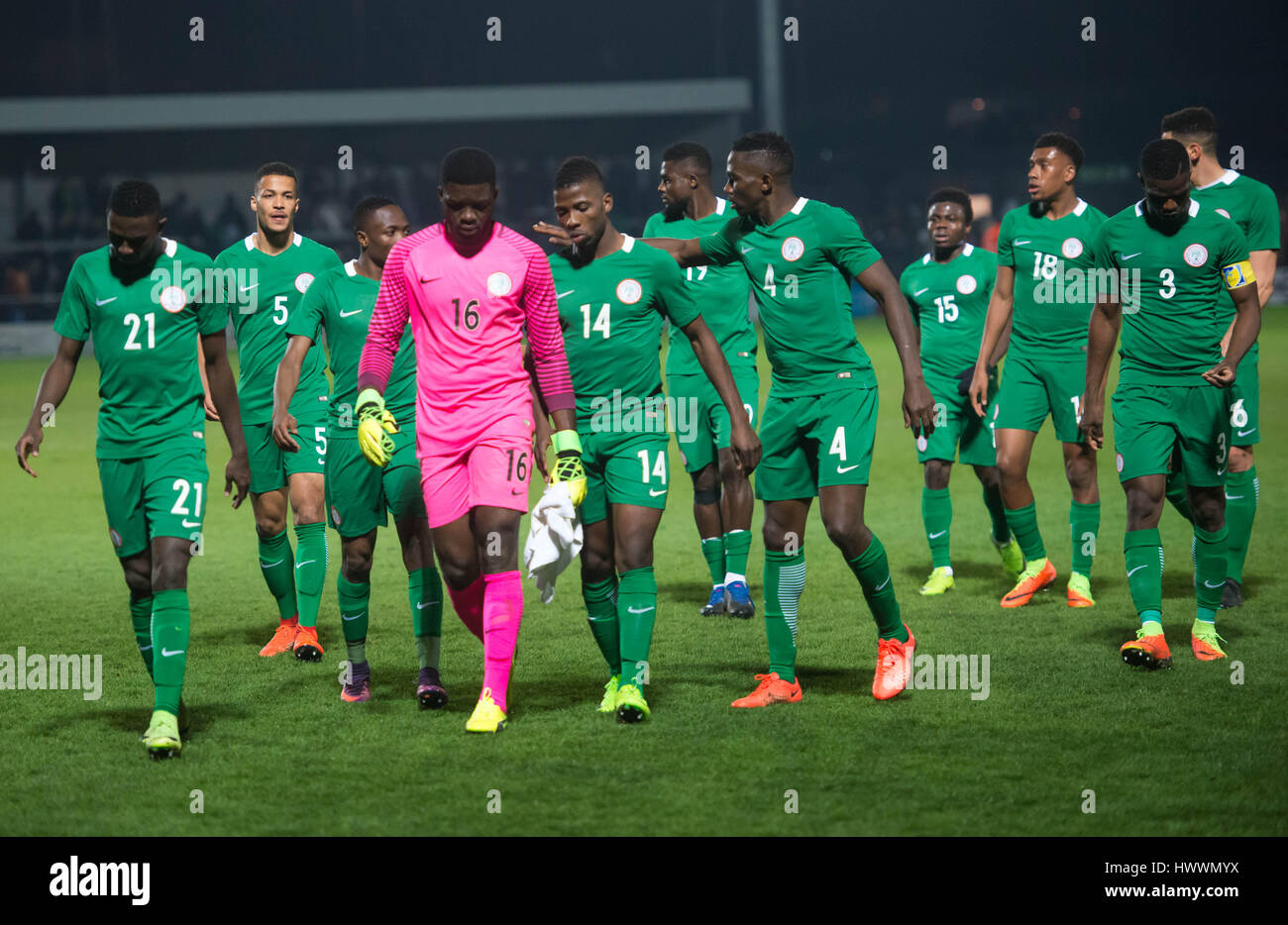Reece Who Brought Soccer To Nigeria: History Of Football In Nigeria
페이지 정보
본문
학생이름: Reece
소속학교: EY
학년반: WF
연락처:
A massive 67% of Nigerians watch Football, which demonstrates how much the sport affects Nigerian culture. Football's journey in Nigeria began over 100 years back, shaping the country's sporting landscape.

Football in Nigeria go back to the early 1900s. British colonisers brought the sport to the country in 1904. The first recorded football match occurred that exact same year, starting Nigeria's abundant footballing history.

By 1950, Football had ended up being Nigeria's national video game. Its fast rise led to many clubs and associations forming in the early 1900s. This growth enhanced Nigerian pride and assisted motivate political freedom movements.
Nigeria's football tradition now reaches beyond its borders. Throughout the years, the country has actually produced world-class skill, and Nigerian youth teams have won the FIFA U-17 World Cup 5 times.
The Super Eagles, Nigeria's national team, are a force in African Football. They typically qualify for significant tournaments and make their mark internationally.
The British Colonial Introduction of Football to Nigeria
Football showed up in Nigeria during the British colonial era. It quickly recorded the hearts of locals, marking the start of a rich footballing custom in the nation.
The First Football Match in 1904
The first football match in Nigeria happened in June 1904. It was between Hope Waddell Training Institution and the crew of HMS Thistle. The Nigerian team won 3-2, triggering a nationwide passion for the sport.
Hope Waddell Training Institution vs HMS Thistle
I hope the Waddell Training Institution in Calabar played a crucial function in early Nigerian Football. Their success over HMS Thistle's crew showed the talent of Nigerian gamers. This match set the stage for Football's development in the nation.
Early Football Club Formation (1906-1932)
After the 1904 match, Football's appeal soared. From 1906 onwards, early football clubs started forming, and this grassroots movement spread the sport throughout Nigeria.
The Lagos District Amateur Football Association (LDAFA) was developed in 1932. The LDAFA marked the start of organised Football in Nigeria and led the way for the sport's future success nationally and internationally.
Who Introduced Football in Nigeria
Football showed up in Nigeria in the early 20th century. British colonisers brought this precious sport to the West African nation. It rapidly ended up being an enthusiasm that formed Nigeria's sporting landscape for generations.
Function of British Colonisers
British colonisers played a vital function in Nigeria's football history. The first football association taped match took place in June 1904. Hope Waddell Training Institution dealt with the team of HMS Thistle.
The Nigerian group won 3-2. This success marked the start of an abundant football tradition in the nation.
Formation of First Football Association
The Lagos District Amateur Football Association (LDAFA) was developed in 1932. It laid the groundwork for organised Football in Nigeria, which paved the way for the Nigerian Football Association (NFA).
The NFA was founded in 1945. It ended up being the national governing body for Football and supervise its advancement throughout the country.
Development of Local Football Culture
Football rapidly settled in Nigeria, becoming the national sport by 1946. Its accessibility and basic guidelines helped it spread quickly. Regional neighborhoods embraced the video game, forming their groups.
This grassroots enthusiasm laid the structure for Nigeria's future success. The country's enthusiasm for Football grew, causing achievements on the international stage.
"Football ended up being more than simply a sport; it evolved into a crucial Nigerian culture and identity element."
The British colonisers' intro of Football stimulated a sporting transformation in nigeria national. Football's journey mirrored the nation's growth from the first football association match in 1904 to the formation of the NFA in 1945.
Today, Football stays an integral part of Nigerian life. It's a testament to the sport's long-lasting appeal and cultural significance in the country.
The Rise of Nigerian Football Administration
The Nigerian Football Association (NFA) was developed in 1945. It played an important function in shaping Nigerian Football. In 1949, the NFA formed Nigeria's very first national football group.
In 1959, Nigeria joined the Confederation of African Football (CAF), which permitted it to participate in continental tournaments. Nigeria also became a FIFA member in 1960, joining the international football neighborhood.
The NFA, later on renamed the Nigeria Football Federation (NFF), organised national competitions. They created the Nigerian Premier League and the Federation Cup, which ended up being the highlights of domestic Football.
Football associations across Nigeria prospered under the NFF's assistance. They supported talent and promoted grassroots development. Expert Football began in 1990 with sixteen club sides participating.
"Our mission is to revive football development at the nationwide level and repackage the league in line with global best practices," mentions the Nigeria National League.
The Premier League was carried out in 2003. This move intended to enhance domestic football standards and attract more viewers and sponsors to national competitions.
Nnamdi Azikiwe's Impact on Nigerian Football
Nnamdi Azikiwe, born in 1904 in Zungeru, Northern Nigeria, left an indelible mark on nigerian youths Football. His influence formed the country's sporting landscape. Azikiwe's enthusiasm for sports stemmed from his varied experiences and education abroad.
Facility of Zik's Athletic Club
In 1938, Azikiwe established Zik's Athletic Club (ZAC) in Lagos. This club became a symbol of African self-determination. ZAC played a vital function in developing Nigerian Football.
It provided a platform for young professional football league athletes to display their abilities. The club promoted regional skill and fostered a sense of national pride.
The West African Pilot's Influence
Azikiwe's newspaper, the West African Pilot, played a considerable function in popularising Football across Nigeria. It thoroughly covered local matches, group news, and gamer profiles. This media attention assisted grow the sport's fan base.
Football as a Tool for Independence
Azikiwe saw Football's prospective as a unifying force in the self-reliance motion. He utilized the sport to break down ethnic barriers, and Football became a symbol of Nigerian unity through his advocacy.
Azikiwe's efforts linked Football to nationalism, contributing substantially to the sport's development and shaping its function in modern Nigeria.
"Football is not just a game; it's an effective nationwide unity and identity tool."
Nigeria's Journey to International Football Recognition
Nigeria's football journey took a substantial leap forward in 1960. The country gained FIFA subscription, marking its entry into worldwide Football. This milestone accompanied Nigeria's self-reliance from British rule.
FIFA Membership and First International Match
Nigeria's very first global match took place on 8 October 1949. They dealt with Sierra Leone and won 2-0 in a historical encounter. This triumph sparked interest for Football across the nation.
Early Continental Competitions
Nigeria debuted in the Africa Cup of Nations in 1963. The tournament, hosted by Ghana, saw Nigeria facing tough opponents. These experiences proved important for the group's growth.
Nigeria's perseverance paid off in 1973. They clinched gold at the All-Africa Games, marking their very first football association significant continental success. 1976, they secured bronze at the Africa Cup of Nations in Ethiopia.
Nigeria's football expertise grew in the 1970s. In 1978, they repeated their bronze medal accomplishment in Ghana. 1980, Nigeria hosted and won its very first Africa Cup of Nations title.
Development of Nigerian Football Governance
Nigerian football governance has seen significant modifications and obstacles considering that 1945. The Nigeria Football Federation has actually formed the nation's football landscape, and its journey has been complex and transformative.
From NFA to NFF
The Nigeria Football Association began in 1945. It ended up being the Nigeria Football Federation in 2008. This modification aimed to modernise the organisation's structure.
In 2019, a costs was passed to identify the NFF formally. It's still awaiting presidential approval.
Advancement of League Systems
The NFF supervises three primary leagues: the Nigerian Premier League, Amateur League, and Women's League. These competitions form the foundation of Nigerian Football.
They cultivate skill and promote the sport across the country. Nevertheless, difficulties like postponed seasons and venue disagreements persist.
National Team Formation
Nigeria's Super Eagles national team was formed in 1949. They've qualified for six FIFA World Cups and won three Africa Cup of Nations titles.
These achievements have actually improved Nigeria's standing in international Football. The Super Eagles' success has put Nigeria on the worldwide football map.
However, Nigerian Football faces ongoing challenges. A study revealed high levels of corruption in football governance. This affects agreement awards and gamer selection.
These concerns highlight the requirement for reform. For the sport to flourish, openness in the Nigerian football administration need to enhance.
Conclusion
Nigerian Football's legacy showcases the country's durability and enthusiasm. It began in 1904 with Hope Waddell Training Institute dealing with HMS Thistle. Ever since, Nigeria has ended up being a powerhouse in African Football.
The sport's growth shows the country's journey from colonial rule to self-reliance. It has fostered a sense of national identity and unity. Nigeria's worldwide football recognition is undeniable that football.
The Super Eagles' gold medal at the 1996 Atlanta Olympics is an emphasize. Their excellent FIFA World Cup performances likewise stand apart. Nigeria has actually received six World Cups.
In 1994, Nigeria achieved its highest FIFA ranking of 5th, solidifying its place on the international phase. Nigerian Football continues to progress with appealing potential customers.
Skills like Ahmed Musa and Kelechi Iheanacho shine in leading European leagues. This bodes well for the sport's advancement. The Nigeria Football Federation guides the game's development.
Football's withstanding legacy in Nigeria motivates upcoming generations and promises an interesting future for the sport. The gorgeous game remains a source of national pride and unity.
FREQUENTLY ASKED QUESTION
Who introduced football to Nigeria?
British colonisers brought Football to Nigeria in the early 1900s. The sport rapidly ended up being popular and woven into Nigerian culture.
When was the first football match played in Nigeria?
The very first documented football match in Nigeria occurred in June 1904. Hope Waddell Training Institution bet the HMS Thistle team. The Nigerian group won 3-2.
How did Football become Nigeria's national sport?
Football's simple rules and accessibility made it popular in Nigeria. By 1950, it was the national video game, inspiring pride and freedom movements.
What role did Nnamdi Azikiwe play in Nigerian Football?
Nnamdi Azikiwe, Nigeria's first President, was important in establishing Football. He started Zik's Athletic Club in Lagos in 1938, and his newspaper, the West African Pilot, connected Football to the self-reliance motion.
When did Nigeria join FIFA?
Nigeria ended up being a FIFA member in 1960, the very same year it got self-reliance. This significant Nigeria's official entry into international football governance.
What is the Nigerian Football Federation?
The Nigerian Football Federation (NFF) governs Football in Nigeria. It developed from the Nigerian Football Association, established in 1945. The NFF organises nationwide leagues and competitors, consisting of the Premier League and Federation Cup.
What significant successes has Nigerian Football achieved?
Nigeria has actually played in six FIFA World Cups. The Super Eagles national team has won 3 African Cup of Nations. They've also won gold in the 2nd All-Africa video games.

- 이전글Answers about Jim Beam 24.12.10
- 다음글2grow.Ad 24.12.10